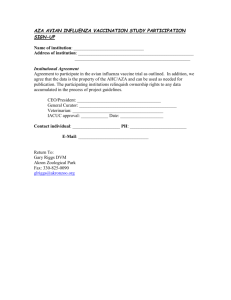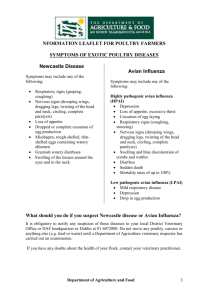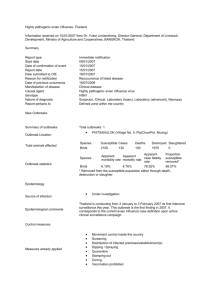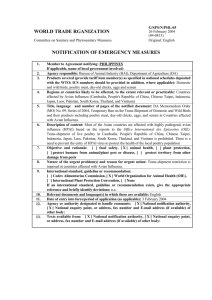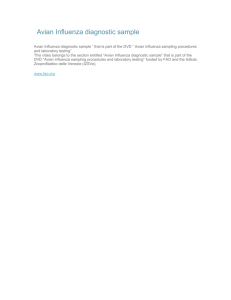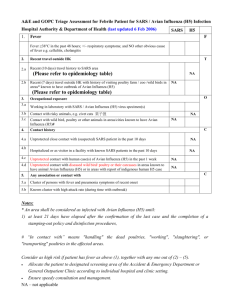Inbound Traffic
advertisement
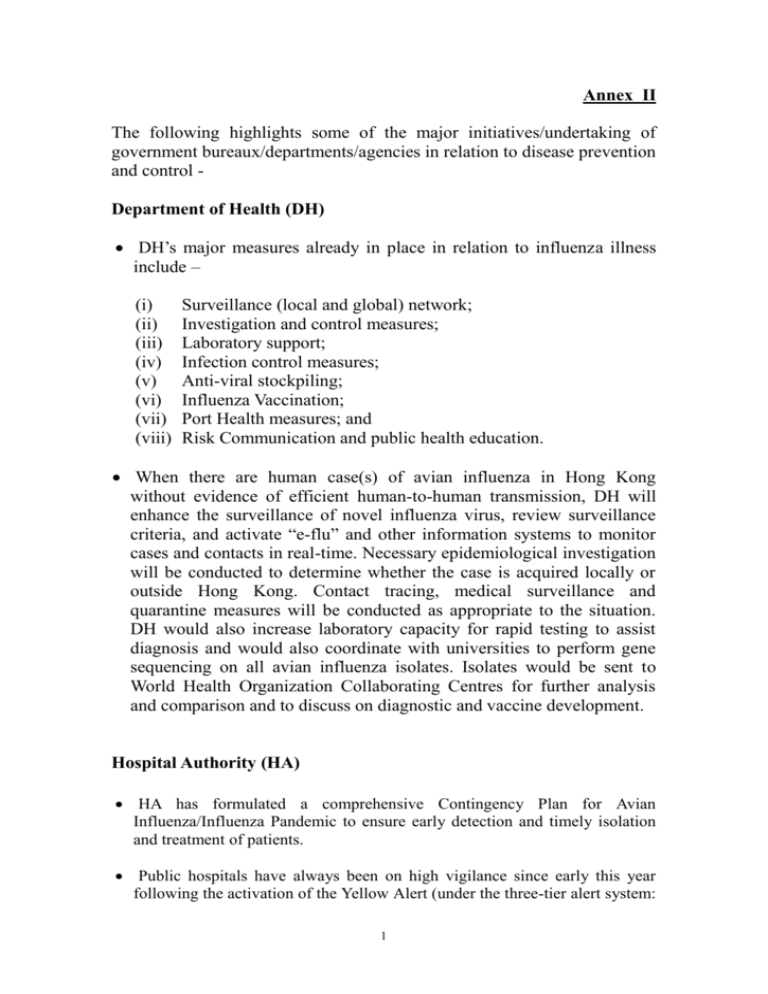
Annex II The following highlights some of the major initiatives/undertaking of government bureaux/departments/agencies in relation to disease prevention and control Department of Health (DH) DH’s major measures already in place in relation to influenza illness include – (i) (ii) (iii) (iv) (v) (vi) (vii) (viii) Surveillance (local and global) network; Investigation and control measures; Laboratory support; Infection control measures; Anti-viral stockpiling; Influenza Vaccination; Port Health measures; and Risk Communication and public health education. When there are human case(s) of avian influenza in Hong Kong without evidence of efficient human-to-human transmission, DH will enhance the surveillance of novel influenza virus, review surveillance criteria, and activate “e-flu” and other information systems to monitor cases and contacts in real-time. Necessary epidemiological investigation will be conducted to determine whether the case is acquired locally or outside Hong Kong. Contact tracing, medical surveillance and quarantine measures will be conducted as appropriate to the situation. DH would also increase laboratory capacity for rapid testing to assist diagnosis and would also coordinate with universities to perform gene sequencing on all avian influenza isolates. Isolates would be sent to World Health Organization Collaborating Centres for further analysis and comparison and to discuss on diagnostic and vaccine development. Hospital Authority (HA) HA has formulated a comprehensive Contingency Plan for Avian Influenza/Influenza Pandemic to ensure early detection and timely isolation and treatment of patients. Public hospitals have always been on high vigilance since early this year following the activation of the Yellow Alert (under the three-tier alert system: 1 Green, Yellow, Red Alert) by HA. In close collaboration with the CHP, HA will activate the following key measures which are covered in the Contingency Plan during the pandemic: (i) (ii) (iii) (iv) (v) (vi) (vii) (viii) (ix) (x) Central command and coordination Strengthened infection control measures Close surveillance and reporting of symptomatic cases Enhanced laboratory support for rapid test Clinical management guidelines & stockpile of antivirals Management of Personal Protective Equipment and medical facilities Collaboration with private sectors and the community Deployment and training for staff Provision of essential services Internal and external communication Education and Manpower Bureau (EMB) A circular memorandum on “Stepping up precautionary measures to prevent the spread of influenza in schools” was issued on 25 October 2005. It aims at reminding schools to adopt the preventive measures as advised by Department of Health (DH). All advice and guidelines issued to schools by DH and its Centre for Health Protection (CHP) regarding communicable diseases has been uploaded to EMB’s home page for reference by schools and parents. EMB has linked the relevant information on prevention of communicable diseases on the websites of DH and CHP to the guidelines and circulars issued by EMB to schools for their easy reference. Agriculture, Fisheries and Conservation Department (AFCD) Increased surveillance and monitoring of local chicken farms. Strict enforcement of farm biosecurity measures. Reminder to all livestock farmers to immediately report the presence of sick and dead birds for collection and laboratory examination. 2 Increased monitoring of chicken numbers to ensure all birds areas are accounted for. Continuation of avian influenza vaccination for local chickens. Re-issue guidelines to farmers to remind them of the importance of good biosecurity and penalties for non-compliance. Inspect and review stock of personal protective equipment (PPE) for poultry culling operations. Arrange for influenza vaccination for staff who might be potentially involved in culling operations. Conduct culling drills and training exercises for AFCD staff and CAS staff. Auxiliary Medical Service (AMS) An Action Team with AMS members trained for handling communicable diseases has been formed since 2003. The existing strength of this Team is 1,229 including 924 completed Communicable Diseases Management Training conducted by AMS and 305 completed CHP Health Protection Training. The Team could be mobilized within 30-45 minutes. A set of guidelines on prevention and control of communicable diseases has been prepared. An AMS Contingency Plan for Communicable Diseases has been drawn up. The key roles of AMS are: (i) manning health posts at border control points for screening of body temperature and arrange conveyance of suspected patients to hospitals; (ii) setting up posts at lobby of buildings for temperature screening and dispatching of patients; (iii) manning health post at isolation centres; and (iv) assisting in contact tracing of suspected patients and answering hotlines. Stockpile PPEs for emergency operational use. 3 Buildings Department (BD) BD stands ready to deal with any problems relating to the fabric of buildings in collaboration with other government departments. BD will effect actions on emergency inspections and investigation of private buildings upon request by DH to give advice on the building conditions, and to take any actions as may be necessary under the Buildings Ordinance. Civil Aviation Department (CAD) CAD has taken necessary steps to prepare for influenza pandemic and to ensure that disruption to airport operation would be minimized during a bird flu outbreak. Being a service provider in air traffic management, CAD has : (i) developed a Departmental Contingency Plan to deal with Communicable Disease Outbreaks. The Plan contains the followings: - guidelines and procedures to follow when a staff member, a member of his household or any person with whom the staff has frequent and close contact contracted a communicable disease; - operational specific contingency plans according to specific functions and duties of each of its divisions; - arrangement for internal administration of the Department, communication and reporting hierarchy in the event of an outbreak, cleaning and disinfection services to be provided to the various offices of the Department including the Air Traffic Control Tower. (ii) issued internal circular to raise awareness of staff of the bird flu virus and the importance of ensuring personal hygiene; and (iii) ensured that sufficient stock of personal protective items, e.g. masks and alcohol wipes, are available for staff. As a regulatory authority of civil aviation, CAD has been in close 4 liaison with the Airport Authority Hong Kong and local airlines to ensure that adequate preventive measures and contingency plans are in place to respond to a potential bird flu outbreak. Actions to be taken at the airport will include : (i) monitoring body temperature of airport staff; (ii) stepping up cleaning and disinfection of public installation; (iii) providing adequate facilities and cleaning material for hand washing; (iv) stepping up maintenance on indoor ventilation system; (v) ensuring adequate equipment for protection for frontline staff; (vi) restricting access control to critical operation control centres; (vii) reporting cases and maintaining close contact with DH; and (viii) ensuring procedures are set out in airline operational manuals for handling suspected passengers, cleaning of infected aircraft, and notification. Civil Aid Service (CAS) The CAS has a Standing Operations Procedure on Outbreak of Communicable Disease The CAS is ready to provide the following services: (i) crowd management at hospitals, clinics, temporary shelters etc. (ii) establishment and subsequent management of isolation centres (iii) evacuation of residents affected by the disease In addition to the above, the CAS is ready to provide the following services: (i) assist AFCD in the culling operation 5 (ii) removal of residents/workers from poultry farms affected by the disease Electrical and Mechanical Services Department (EMSD) EMSD would strengthen their engineering services provided to other government departments & public bodies (e.g. to increase the air exchange rate of air-conditioning & ventilation systems as deemed necessary). EMSD would also provide professional engineering support to assist other government departments & public bodies in any necessary alteration and improvement of engineering systems (e.g. ventilation systems) so as to prepare for flu outbreak. Food and Environmental Hygiene Department (FEHD) Stepped up monitoring of live poultry at import and retail levels. Reminder letters issued to the retail trade on close observance of hygiene requirements and conditions and prompt report of dead/sick poultry. Culling drill completed in September and adequate stock of PPE for poultry culling operations available. Poultry trade and staff who have or are liable to have contact with poultry and those may be deployed on massive culling operations have been arranged to receive free influenza vaccination in November/December. Import of live poultry and/or poultry products from affected countries/area suspended. 6 Fire Services Department (FSD) All ambulance personnel will be arranged to have flu vaccination on a voluntary basis; FSD will keep in close contact with DH and HA for the most updated situations about flu outbreak and to implement necessary operational contingency reaction. PPE (surgical masks, N95 masks and disposable gowns) for ambulance personnel have been checked to have about six months’ stocks. Government Property Agency (GPA) Stepping up cleaning service to the common areas in the government joint-user office buildings (JUBs) and quarters under the Agency’s management by the outsourced Property Management Agents (PMAs). Coordinating with EMSD to step up cleaning of air-filters in the air-conditioning system and increase fresh air intake in the JUBs, when and where necessary. Coordinating with ArchSD to inspect all the drainage systems and sanitary fitments in the JUBs and government quarters, when and where necessary, and institute suitable remedial/improvement actions. Home Affairs Department (HAD) HAD will take the following actions during the outbreak situations to assist in the publicity drive by distributing leaflets, guidelines and health advice to members of public through District Offices; and to mobilize the community to support the relevant campaigns launched by the Administration. 7 Housing Department Action has been strengthened to preserve environmental hygiene and cleanliness in markets. Intensified cleansing of public housing estates by the way of “Operation Tai Ping Tei”. Messages for the purpose of reminding estate residents to upkeep personal hygiene will be promulgated. Enforcement action against misdeeds, such as littering and spitting, that may be conducive to the spread of infectious diseases, has been stepped up. Estate residents are liable to fixed penalty fine of $1,500 and/or points be deducted under the Marking Scheme of Tenancy Enforcement, if they dirty the public areas while feeding feral birds/pigeons. Local management will be requested to identify hygiene black spots and areas with high density of feral birds/pigeons. Action will be taken to intensify cleansing operations to black spots so identified. Estate staff have been deployed to frighten away feral birds. Rolling text with message to remind estate residents not to feed feral birds/pigeons has been broadcasted on the Housing Channel. Cleansing contractors have been requested to clean/disinfect the press buttons of lifts in public residential housing blocks three times a day. Labour Department (LD) Avian influenza arising out of and in the course of farming and handling poultry and poultry products has been made a notifiable occupational disease since February 2005. For each and every occupational avian influenza case notified to LD, detailed investigation will be conducted and control measures will be undertaken. As in all occupational infections, LD would liaise with the CHP to speed up all the necessary control measures. 8 In case of an outbreak of avian influenza, LD would enhance our inspection to high-risk workplaces. If the avian influenza outbreak is found to be confined only to poultry, LD’s inspections would be targeted mainly at poultry farms, markets, restaurants, etc. If there is evidence of human-to-human transmission, inspection would be extended to cover other high-risk workplaces such as hospitals, clinics and elderly homes. Inspections would be conducted to determine the adequacy of respiratory protection, indoor ventilation, cleansing as well as infection control measures. In the case of widespread human-to-human transmission of avian influenza, the doctors and nurses of LD are prepared to be re-deployed to the CHP to strengthen the medical team there in the control of this disease in Hong Kong. Leisure and Cultural Services Department (LCSD) LCSD has prepared a Departmental Action Plan on Influenza Pandemic, setting out the actions to be required of LCSD in different response levels. LCSD maintains a collection of about 1 500 birds in four major parks, namely Hong Kong Zoological & Botanical Gardens, Hong Kong Park, Kowloon Park and Yuen Long Park. Extra vigilance on the presence of bird disease has been maintained within our collection. LCSD’s Senior Veterinary Officer monitors the health of our bird collections closely. Bird-keeping staff have been reminded to follow strictly the departmental guidelines on contact with birds during the course of their work and to enhance their personal hygiene. All the cleansing staff and contractors have also been reminded to wear proper protective clothing/gear when clearing the bird droppings left on the ground. Precautionary measures have been stepped up to ensure health condition of our bird collections. These include increasing the frequency of faecal testing of birds and cleansing of bird cages; and suspending acquisition and transfer of birds. Any dead wild birds found in our venues will be safely handled by LCSD staff and sent to AFCD for avian flu checking. 9 The public have been advised not to feed the wild birds in LCSD venues and LCSD staff will take prosecution action accordingly. Warning signs to advise the public against contact with birds or their dropping have been put up in the areas where there are bird collections or where wild birds aggregate. Drill programmes on closing the aviaries are conducted regularly to enhance our preparedness for the possible outbreak of bird flu. Arrangement has been made with DH for LCSD’s field staff including staff of the contractors working at four aviaries and Yuen Po Street Birds Garden to receive influenza vaccine commencing 21 November. Marine Department (MD) Maintaining Port Safety During an outbreak, MD will accord priority to managing port safety and maintaining port operations. The first priority will be to adequately manned the Vessel Traffic Centre (VTC) the primary function of which is to regulate and maintain traffic safety. In the next week or so, the Department will draw up a list of qualified and trained staff for manning the VTC. Should VTC staff be affected by an outbreak, trained staff from other offices will be deployed to the VTC such that services with a lower priority will be affected initially. Inbound Traffic The Pre-Arrival Notification (PAN) from ocean-going vessels will serve as an information collection tool for visiting ships. MD will follow the advice from DH as to what symptoms and information should be declared by such vessels. The requirements will be promulgated by a Marine Department Notice for ships to follow. Subject to advice by DH on how to manage/control vessels with reported/suspected cases of Avian Flu, MD can set aside anchorages for quarantine/seggregating vessels for inspection by DH. Rivertrade vessels are also covered by PAN and can be accordingly treated. 10 Outgoing Traffic MD will act in accordance with advice from DH as to whether any declaration is required by a ship or the need for an inspection by DH etc. MD Managed Cross-boundary Ferry Terminals If a quarantine area is needed according to DH advice, MD will endeavour to designate an area within the terminals. MD will gear up to facilitate DH in implementing any measures that are considered necessary. The situations at the terminals will be closely monitored and cleansing services will be enhanced as necessary. Hong Kong Police Force (HKPF) HKPF has developed a comprehensive set of guidelines for its response to all types of infectious disease, including influenza. HKPF has shared its knowledge and expertise with the CHP, and since 2003, has seconded a Superintendent and Chief Inspector to the CHP to help facilitate Government planning for any future infectious disease outbreak. Contact Tracing Police will deploy the Major Incident Investigation and Disaster Support System (MIIDSS), for contact tracing and the identification of potential disease hot spots. Police Regional Missing Persons Units and if necessary Crime Formations, will be used to trace contacts, and locate individuals classified as defaulters. Major and Widespread Outbreaks Where the infectious disease leads to large scale deaths, police will be primarily concerned with the maintenance of public order, and ensuring that multi-disciplinary response teams and medical personnel are able to safely go about their business. 11 Internal Measures to Safeguard Police Personnel To ensure that police officers are available to discharge their duties during an infectious disease outbreak, HKPF has initiated a number of measures in respect of an alert system, staff, buildings, equipment, transport, prisoners, handling dead bodies and handling property and exhibits. Hong Kong Post (HKP) HKP has issued an Action Plan for Highly Pathogenic Avian Influenza and Pandemic Influenza covering risk communications, PPE stockpiling, office disinfection, disease prevention and hygiene guidelines and special delivery arrangement, etc. Social Welfare Department (SWD) SWD had in place the Contingency Plan for Influenza Outbreaks since January 2005. It is a three-tier action plan corresponding to the three-level response system of the Hong Kong. In Serious Response Level, District Social Welfare Officers will activate a 24-hour staff roster to provide welfare services to those citizens in home confinement. With the assistance of DH, SWD had compiled and issued guidelines in April 2005 to all residential services, day services and other general welfare service units to advise on prevention, precautionary measures, alert and emergency measures to be taken in Avian Influenza. These service units are also told to draw up their own contingency measures. Ongoing advices received from DH are also disseminated to the welfare service units An enhanced information exchange mechanism is in place among DH, HA and SWD to enable early detection and timely notification in residential care home for the elderly and people with disabilities to combat any infectious disease outbreaks. In collaboration with DH, briefing to SWD staff and NGO sector on Influenza Pandemic and the Government Preparedness Plan had been conducted in July 2005. Besides, for staff of residential homes, training classes have been organized for them on infection control 12 measures in mid-2005. Influenza vaccination for elderly and people with disabilities living in institutions and their home staff are being arranged in November 2005. Tourism Commission The Tourism Commission also maintains close liaison with the travel trade to keep them updated of the latest news and development of potential infectious diseases in Hong Kong; and to remind them of the need to adopt relevant preventive measures. The tourism sector, including the airlines, hotels, restaurants, travel agents, tourist guides and tour coach operators have observed the guidelines and advice issued by the DH and have put in place measures to protect the health of their staff and visitors. Both the Tourism Commission and the Hong Kong Tourism Board are also in touch with Mainland international and regional tourism organisations to exchange the most up-to-date information on destinations and health-related matters in the region, and to collaborate on the appropriate plans and responses. 13
